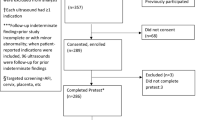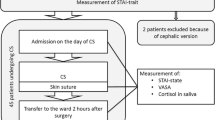Abstract
Objective
The value of genetic sonogram is controversial in low-risk population. The aim of our study was to compare the anxiety levels among women with high risk and low risk for fetal chromosomal/structural defects.
Materials and methods
A total of 115 consecutive pregnant women were included. The anxiety levels were assessed by the use of Turkish version of the standardized state-trait-anxiety-inventory. Before and after genetic sonogram, state and trait-anxiety was measured.
Results
The mean state anxiety score before genetic sonogram was statistically, significantly higher than the mean score after the examination. Before genetic sonogram, the mean state-anxiety score of the women with high risk for fetal chromosomal/structural defects was significantly higher than the mean score of women with low risk. Following genetic sonogram, although the anxiety scores decreased, the scores of women with high risk still remained significantly higher than the scores of women with low risk and the anxiety scores significantly further increased among women with a positive minor or major ultrasound finding.
Conclusion
Genetic sonogram presents an anxiety-inducing situation for the parents-to-be. The level of experienced anxiety was found to be proportional to the level of the perceived risk. Women with low risk for chromosomal/structural defects experienced lower anxiety than women with high risk. Following the examination, women with a negative result were found to have a significant reduction of anxiety and emotional relief whereas a positive test result led to a further increase in anxiety scores.
Similar content being viewed by others
References
Nyberg DA, Souter VL (2003) Use of genetic sonography for adjusting the risk for fetal Down syndrome. Semin Perinatol 27:130–144. doi:10.1053/sper.2003.50012
Vintzileos AM, Campbell WA, Rodis JF, Guzman ER, Smulian JC, Knuppel RA (1996) The use of second-trimester genetic sonogram in guiding clinical management of patients at increased risk for fetal trisomy 21. Obstet Gynecol 87:948–952. doi:10.1016/0029-7844(96)00053-1
Leo Y, Vintzileos AM (2003) The use of genetic sonography to reduce the need for amniocentesis in women at high-risk for Down syndrome. Semin Perinatol 27:152–159. doi:10.1053/sper.2003.50014
Vintzileos AM, Ananth CV, Smulian JC, Beazoglou T, Knuppel RA (2000) Routine second-trimester ultrasonography in the United States: a cost–benefit analysis. Am J Obstet Gynecol 182:655–660. doi:10.1067/mob.2000.103943
Bahado-Singh RO, Oz UA, Mendilcioglu I, Mahoney MJ (2005) The mid-trimester genetic sonogram. Semin Perinatol 29:209–214. doi:10.1053/j.semperi.2005.06.005
Jorgensen FS (1995) Attitudes to prenatal screening, diagnosis and research among pregnant women who accept or decline an alpha-fetoprotein test. Prenat Diagn 15:419–429. doi:10.1002/pd.1970150504
Eurenius K, Axelsson O, Gällstedt-Fransson I, Sjöden PO (1997) Perception of information, expectations and experiences among women and their partners attending a second-trimester routine ultrasound scan. Ultrasound Obstet Gynecol 9:86–90. doi:10.1046/j.1469-0705.1997.09020086.x
Kowalcek I (2007) Stress and anxiety associated with prenatal diagnosis. Best Pract Res Clin Obstet Gynaecol 21:221–228. doi:10.1016/j.bpobgyn.2006.11.009
Kowalcek I, Mühlhoff A, Bachmann S, Gembruch U (2002) Depressive reactions and stress related to prenatal medicine procedures. Ultrasound Obstet Gynecol 19:18–23. doi:10.1046/j.0960-7692.2001.00551.x
Kowalcek I, Huber G, Lammers C, Brunk J, Bieniakiewicz I, Gembruch U (2003) Anxiety scores before and after prenatal testing for congenital anomalies. Arch Gynecol Obstet 267:126–129. doi:10.1007/s00404-002-0295-6
Wobie K, Eyler FD, Behnke M, Conlon M (1997) Symbolic expression of feelings and depressive symptoms in high-risk pregnant women. J Fla Med Assoc 84:84–90
Aydemir Ö, Köroğlu E (2006) Psikiyatride Kullanılan Klinik Ölçekler. Ankara: Hekimler Yayın Birliği.s: 153–161
Spielberger CD (1975) Anxiety: state-trait-process. In: Spielberger CD, Saraon IG (eds) Stress and anxiety, vol 1. Washington
Hedegaard M, Henriksen TB, Secher NJ, Hatch M, Sabroe S (1996) Do stressful life events affect duration of gestation and risk of preterm delivery? Am J Epidemiol 7:339–345
Mancuso RA, Scheyyer Dunkel C, Rini CM, Roesch SC, Hobel CJ (2004) Maternal prenatal anxiety and corticotropin-releasing hormone associated with timing of delivery. Psychosom Med 66:762–769. doi:10.1097/01.psy.0000138284.70670.d5
Georgsson Ohman S, Waldenström U (2008) Second-trimester routine ultrasound screening: expectations and experiences in a nationwide Swedish sample. Ultrasound Obstet Gynecol 32:15–22. doi:10.1002/uog.5273
Leithner K, Maar A, Fischer-Kern M, Hilger E, Löffler-Stastka H, Ponocny-Seliger E (2004) Affective state of women following a prenatal diagnosis: predictors of a negative psychological outcome. Ultrasound Obstet Gynecol 23:240–246. doi:10.1002/uog.978
Hoskovec J, Mastrobattista JM, Johnston D, Kerrigan A, Robbins-Furman P, Wicklund CA (2008) Anxiety and prenatal testing: do women with soft ultrasound findings have increased anxiety compared to women with other indications for testing? Prenat Diagn 28:135–140. doi:10.1002/pd.1935
Conflict of interest statement
None.
Author information
Authors and Affiliations
Corresponding author
Rights and permissions
About this article
Cite this article
Api, O., Demır, H.N., Api, M. et al. Anxiety scores before and after genetic sonogram. Arch Gynecol Obstet 280, 553–558 (2009). https://doi.org/10.1007/s00404-009-0959-6
Received:
Accepted:
Published:
Issue Date:
DOI: https://doi.org/10.1007/s00404-009-0959-6




